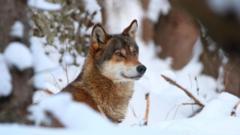Wolves in Europe Face Potential Loss of Strict Protection
The European Commission is proposing to change the protection status of grey wolves, potentially ending 45 years of strict conservation efforts. Currently, wolves are listed under Annex II of the Bern Convention, which provides comprehensive protection. The proposed move to Annex III would allow EU countries to set annual quotas for wolf culling.
The Commission argues that the wolf population has nearly doubled from 11,000 in 2012 to over 20,000 today, causing increasing conflicts with livestock farmers. József Rácz, a shepherd in Romania’s Carpathian mountains, exemplifies these challenges. He loses five to six sheep each year to wolves and bears, relying on 17 dogs to protect his 500-strong flock.
However, wildlife experts and conservationists strongly oppose the proposed change. They argue that wolves play a crucial ecological role and that alternative solutions exist to manage human-wildlife conflicts. Michal Haring, a biologist from Slovakia, highlights the wolves’ importance in controlling disease, particularly in suppressing African swine fever.
A 2023 EU report provides compelling data against widespread wolf culling. It reveals that wolves kill only about 50,000 of Europe’s 68 million sheep and goats annually – a mere 0.065% of the total livestock population. Moreover, there have been no fatal wolf attacks on humans in 40 years.
Wildlife experts point out that indiscriminate hunting can actually exacerbate livestock predation. Wolves typically hunt in packs of five to eight, usually consisting of a breeding pair and their offspring. Removing older wolves can fragment these packs, making the remaining wolves more likely to attack domestic animals.
Laurent Schley from Luxembourg’s Wildlife department offers a broader perspective, arguing that wealthy European countries should be willing to coexist with wolves, just as they expect other nations to protect their endangered species.
The debate highlights the complex balance between human interests and wildlife conservation. While farmers like József Rácz experience real economic losses and emotional distress – he lost his favorite dog, Moody, to wolves last year – conservationists emphasize the wolves’ ecological significance.
Proposed solutions include improved protection methods, such as trained sheep dogs and better livestock management techniques. Some experts suggest that only wolves posing a direct threat to human safety should be considered for removal.
As the debate continues, the potential change in wolf protection status could have significant implications for European wildlife conservation. The decision will need to balance the concerns of farmers, the ecological importance of wolves, and the broader principles of wildlife protection.
The outcome remains uncertain, but it’s clear that finding a sustainable coexistence between humans and wolves remains a complex and emotionally charged issue across Europe.




